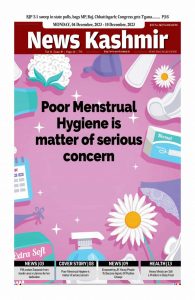Poor Menstrual Hygiene is matter of serious concern
By Rameez Makhdoomi
Menstruation is part and parcel of every women’s life .
By definition, Menstruation is also known by the terms menses, menstrual period, menstrual cycle or period. Menstrual blood — which is partly blood and partly tissue from the inside of your uterus — flows from your uterus through your cervix and out of your body through your vagina. Menstruation is driven by hormones.
Good menstrual health and hygiene practices can prevent infections, reduce odors, and help you stay comfortable during your period. Wash your hands before and after using the restroom and before using a menstrual product.
On the other hand, Poor menstrual hygiene, however, can pose serious health risks, like reproductive and urinary tract infections which can result in future infertility and birth complications. Neglecting to wash hands after changing menstrual products can spread infections, such as hepatitis B and thrush.
Unfortunately, Jammu and Kashmir is among the regions with poor menstrual hygiene.
As per the National Family Health Survey (NFHS-5), nearly 60 per cent of women in Jammu and Kashmir still use cloth for menstrual protection during periods. The survery (2019-2021) also reveals that merely 50.5 per cent of women aged between 15-24 use sanitary napkins. The per centage has swelled from 48.8 per cent in NFHS-4 (2015-2016).
According to official data, the lowest percentage of women using sanitary napkins apart from Jammu and Kashmir are from Uttar Pradesh with 69.4 per cent, Assam with 69.1 per cent, Meghalaya with 65 per cent, and Madhya Pradesh with 61 per cent. Andaman and Nicobar Islands has the lowest rate of women preferring cloth, with 8.2 per cent, while Tamil Nadu with 12.7 per cent is at the second place.
Good menstrual health and hygiene practices can prevent infections, reduce odors, and help you stay comfortable during your period. Wash your hands befor e and after using the restroom and before using a menstrual product.
e and after using the restroom and before using a menstrual product.
 e and after using the restroom and before using a menstrual product.
e and after using the restroom and before using a menstrual product.While talking to this Journalist, Dr Priyanka Sharma, Consultant, Obstetrics and Gynaecology, Fortis Mohali, observed that menstrual health and hygiene (MHH) is not well acknowledged in our country. Still many women and girls are unaware of the basic hygiene practices to be followed during their menstruation like adequate washing of the genitals, use of good absorbent sanitary pads , appropriate clothes and toilet facilities and adequate measures of disposable.
She further adds;
“
Poor menstrual hygiene may lead to problems such as itching or rashes in the perineal region, bad odour, and also major complications such as pelvic inflammatory disease and toxic shock syndrome. These problems can also further lead to reproductive issues like infertility and pregnancy related complications.
Knowledge regarding the physiological processes associated with menstruation has a pivotal role in determining sexual and reproductive health outcomes. Most girls don’t know their bodies are changing when they start menstruating, that menstruation is a biological process, or what they can do to regulate it.
A 2014 report by an NGO, Dasra, said over 23 million girls drop out of school every year due to a lack of adequate MHM facilities, including sanitary napkins and proper knowledge of menstruation.
Menstrual health is not a ‘women’s subject’but it involves the complete society. Comprehensive and meaningful education on menstrual processes, supportive environments, encouraging participation, and honest conversations can help adolescent boys and men, better understand MHH.
Women should be empowered by providing essential services for menstrual management and disposal which is scientifically sound, accessible, and at cost that the community and country can afford. “
Undoubtedly, menstrual hygiene should be taken seriously.



